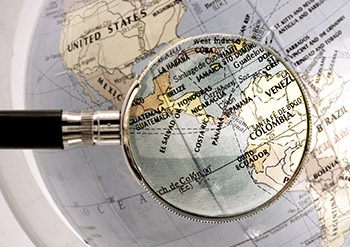Study Abroad Program Takes VSU Nursing Students to Nicaragua
July 26, 2012
12-195
Jessica Pope
Communications and Media Relations Coordinator
Study Abroad Program Takes VSU Nursing Students to Nicaragua

|
VALDOSTA -- Valdosta State University will send 12 students and
an instructor to Nicaragua for a 10-day field study in
transcultural care. The study abroad excursion will be a first for
the College of Nursing and was made possible when one University
System of Georgia institution of higher learning reached out to
another.
Troy Spicer, a faculty member at Abraham Baldwin Agricultural
College’s School of Nursing and Health Sciences in Tifton, took a
group of students to Nicaragua during the summer of 2011. One year
later, he approached VSU’s College of Nursing about joining the
experience.
“I am always interested in finding ways to cooperate with other
schools in order to offer opportunities to more students,” said the
registered nurse and board certified family nurse practitioner who
has facilitated study abroad programs for roughly 14 years, since
his days at Kennesaw State University in North Georgia.
Spicer, who has seven students leaving for Nicaragua on Saturday,
July 28, said that a partnership with VSU made perfect sense.
“A lot of the faculty at ABAC actually graduated from VSU,” he
added. “There are a lot of warm feelings there.”
Denise Atkinson, a board certified family nurse practitioner and
nursing instructor, will lead VSU’s group to Nicaragua. Spicer
referred to her as an ideal person for the role because she serves
the Latino population as a medical professional and has the unique
ability to excite students about cultural experiences.
“This is what I have always wanted to do,” said the Thomasville
native and daughter of Joe and Mary Fallin. “Everything just came
together. ABAC contacted [VSU College of Nursing] Dean [Anita]
Hufft about the partnership, and she asked me if I was interested.
I’ve always wanted to do something like this. I hope to do it every
year and expand to other regions of the world once we get some
experience under our belt.”
As part of the field study in transcultural care, VSU and ABAC
students will visit Lake Nicaragua, Esteli, the Masaya Volcano, and
Historic Granada. Atkinson said they will examine available
resources in the country, as well as the ability of the native
people to promote their own sustainability. They will look at
agriculture and first response systems like fire, law enforcement,
and emergency medical services.
The students will have a chance to visit Casa Materna, which
provides a short-term residence to high-risk pregnancy women, one
to two weeks before and after childbirth, and other outreach
services. Casa Materna’s focus is on reducing rising maternal and
infant mortality rates. In Nicaragua, a maternal death occurs every
38 hours.
“The women come out of the mountains and stay at the maternity
house, where they receive food and education and support,” Atkinson
said. “They are close to medical attention, not hours or days
away.”
While at Casa Materna, the students will learn about and plant
Moringa trees -- also known as miracle trees or vitamin trees.
Atkinson said the tree is often used to fight malnutrition,
especially among infants and nursing mothers. Its leaves can be
eaten fresh, cooked, or stored as a dried powder for months without
refrigeration or a loss of nutritional value. According to Optima
of Africa Ltd., a private company that deals with the tree in
Tanzania, 25 grams of Moringa leaf powder will meet 125 percent of
a child’s daily calcium needs, 61 percent of his or her magnesium
needs, 71 percent of his or her iron needs, 42 percent of his or
her protein needs, and more. Almost every part of the tree can be
used for food or some other beneficial purpose.
“There is a lot of value to folk medicine,” said Atkinson, adding
that the students will have a chance to visit a plantation, of
sorts, where the locals grow medicinal plants and other crops to
both generate revenue and address their own nutritional
needs.
The students will also visit what may best be described as a
dumpsite. Atkinson said it is where the people go and collect
“trash” -- pieces of tin, cardboard, and paper -- to use to build
homes for themselves and their families.
“Nicaragua is considered one of the safest countries in the
Americas, according to the United Nations and the United States
State Department,” Spicer said. “It is also widely reported to be
the second poorest country in the Americas -- North America,
Central America, and South America. The only country poorer is
Haiti.”
Atkinson said she hopes her students are inspired by what they
learn, hear, see, and do in Nicaragua. She hopes they return with a
broader sense of who they are in this ever-changing world and a
better understanding of how a different culture lives and
survives.
Half of her group has never been outside the U.S.
In the future, Akinson noted that the field study in transcultural
care will be open to students from any major and particularly
beneficial for those in Spanish, sociology, psychology, business,
and women’s and gender studies.
Among the students from ABAC participating in the field study are
nursing majors and rural studies majors.
Contact Denise Atkinson, VSU College of Nursing instructor, at
(229) 245-3776 or at dmatkinson@valdosta.edu; VSU’s
Center for International Programs at (229) 333-7410; or Troy
Spicer, ABAC School of Nursing and Health Sciences instructor, at
tspicer@abac.edu to learn
more.
On the Web:
www.casamaterna.org
www.valdosta.edu/nursing
www.abac.edu/nursing
www.valdosta.edu/cip
Newsroom
- Office of Communications Powell Hall West, Suite 1120
-
Mailing Address
1500 N. Patterson St.
Valdosta, GA 31698 - General VSU Information
- Phone: 229.333.5800
- Office of Communications
- Phone: 229.333.2163
- Phone: 229.333.5983